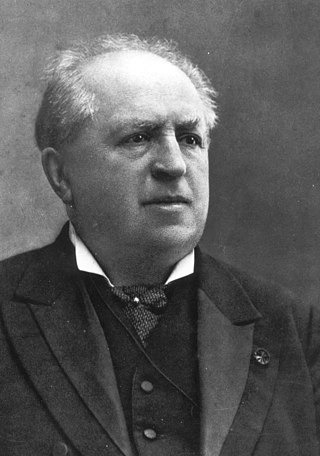The Christian Union is a Christian democratic political party in the Netherlands. The CU is a centrist party, maintaining more progressive stances on economic, immigration and environmental issues while holding more socially conservative positions on issues such as abortion and euthanasia. The party describes itself as "social Christian".

The Reformed Political Party is a conservative Reformed Christian political party in the Netherlands. The SGP is the oldest political party in the Netherlands existing in its present form, and has been in opposition for its entire existence. Since 1925, it has won between 1.5% and 2.5% of the votes in general elections. Owing to its orthodox political ideals and its traditional role in the opposition, the party is considered a testimonial party.

The Anti-Revolutionary Party was a Protestant conservative and Christian democratic political party in the Netherlands. The party was founded in 1879 by Abraham Kuyper, a neo-Calvinist theologian and minister who served as Prime Minister between 1901 and 1905. In 1980 the party merged with the Catholic People's Party (KVP) and the Christian Historical Union (CHU) to form the Christian Democratic Appeal (CDA).

Abraham Kuyper was the Prime Minister of the Netherlands between 1901 and 1905, an influential neo-Calvinist pastor and a journalist. He established the Reformed Churches in the Netherlands, which upon its foundation became the second largest Reformed denomination in the country behind the state-supported Dutch Reformed Church.

Christian Union–SGP is a collaboration between the Dutch political parties Christian Union (CU) and Reformed Political Party (SGP). In some municipal elections and Provincial Council elections, the parties submit a joint list. Before the merger of the Reformed Political Alliance (GPV) and the Reformatory Political Federation (RPF) into Christian Union in 2000, these parties also participated in various combinations, including SGP/RPF/GPV. From 1984 to 2019, the parties participated jointly in the European Parliament elections.

General elections were held in the Netherlands on 5 July 1922. They were the first elections held under universal suffrage, which became reality after the acceptance of a proposal by Henri Marchant in 1919 that gave women full voting rights. Almost all major parties had a woman elected. The number of female representatives increased from one to seven. Only the Anti-Revolutionary Party principally excluded women from the House of Representatives. Another amendment to the electoral law increased the electoral threshold from 0.5% to 0.75%, after six parties had won seats with less than 0.75% of the vote in the previous elections.

The Christian Historical Union was a Protestant Christian democratic political party in the Netherlands. The CHU is one of the predecessors of the Christian Democratic Appeal (CDA), into which it merged in September 1980.

The Hervormd Gereformeerde Staatspartij was an orthodox Protestant political party in the Netherlands during the interwar period. For its orthodox political ideals and its refusal to cooperate in any cabinet, the party is called a testimonial party.

The Free Anti Revolutionary Party was a Dutch conservative Reformed political party, which existed from 1898 to 1903.

The Christian Historical Party was a conservative Reformed political party in the Netherlands which existed from 1903 to 1908.
An election of Members of the European Parliament representing Netherlands constituency for the 1994–1999 term of the European Parliament was held on 9 June 1994. It was part of the wider 1994 European election. Eleven parties competed in a D'Hondt type election for 31 seats.
An election for Members of the European Parliament representing Netherlands constituency for the 1984–1989 term of the European Parliament was held on 14 June 1984. It was part of the wider 1984 European election. Nine parties competed in a D'Hondt type election for 25 seats.

This article gives an overview of Christian democracy in the Netherlands, which is also called confessionalism, including political Catholicism and Protestantism.

The Reformed Churches in the Netherlands (Liberated) (Dutch: Gereformeerde Kerken in Nederland (vrijgemaakt)) was an orthodox Calvinist federation of churches. This church body arose in 1944 out of the so-called Liberation (Vrijmaking) from the Reformed Churches in the Netherlands, when many pastors and members refused to go along with the General Synod's demand to hold to "presumed regeneration of infants" at their baptism. Klaas Schilder played an important role in the Liberation. There were 270 affiliated local congregations with a total of about 120,000 members in 2016.

The Netherlands is a European Parliament constituency for elections in the European Union covering the member state of Netherlands. It is currently represented by 31 Members of the European Parliament. Until the 2009 European Parliament election, it excluded the Dutch in the Netherlands Antilles and Aruba.

Peter van Dalen is a Dutch politician who served as a Member of the European Parliament (MEP) between 2009 and 2023. He is a member of the Christian Union, which used to be part of the European Conservatives and Reformists (ECR), but switched to the European People's Party (EPP) in 2019 following the accession of the far-right Forum for Democracy.

Meindert Leerling was a Dutch journalist and politician of the defunct Reformatory Political Federation (RPF), nowadays merged in the ChristianUnion (CU).
Leendert van der Waal was a Dutch engineer and politician. He was a member of the Reformed Political Party (SGP) and former Member of the European Parliament (MEP).

The Reformed Political League was an orthodox Protestant political party in the Netherlands. The GPV is one of the predecessors of the Christian Union. The party was a testimonial party.














